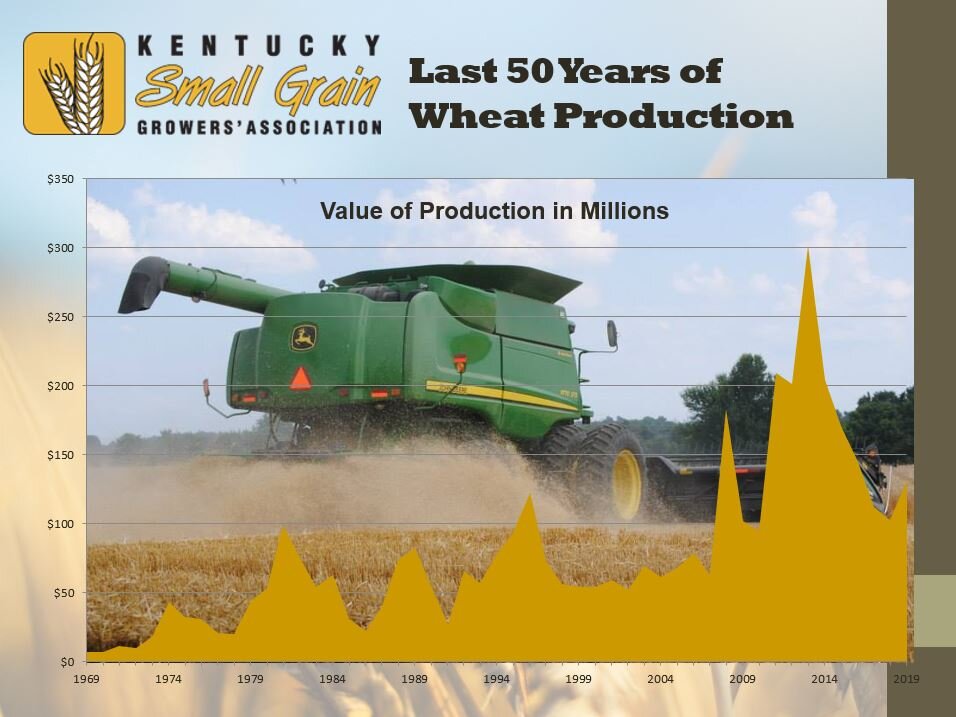Research is a Top Priority for Kentucky Small Grain Production
Production research has always been a major priority of the Kentucky Small Grain Growers. In fact, we have dedicated more than $3.8 million in checkoff to research over the last 28 years. Of that amount, more than $1 million is directed toward the Grain and Forage Center of Excellence.
With our support and farmer collaboration, extension experts and private consultants have helped Kentucky wheat production grow 87 percent since the Kentucky Small Grain Promotion Council was formed, and three of the past five years have resulted in record average wheat yields.
Growing conditions for the 2020 wheat crop in the Commonwealth were generally good, until late spring frosts cut production. “In December last year the crop was rated 90% good and excellent, 30 points above the 5-year average”, said David Knopf, director of the NASS Eastern Mountain Regional Office in Kentucky. “In the end, freezing temperatures in mid-April and again in early May, resulted in a disappointing crop”. The combined loss of yield and fewer acres of harvested grain combined to reduce production from last year.
Farmers harvested 21.4 million bushels of winter wheat during the summer of 2020. This was down 15% from the previous year. Yield is estimated at 63.0 bushels per acre, down 13.0 bushels from 2019. Farmers seeded 510,000 acres last fall, up 50,000 acres from 2019. Area harvested for grain totaled 340,000 acres. Acres for other uses totaled 170,000 acres and was used as cover crop, cut as hay, chopped for silage or abandoned.
According the 2017 Ag Census which was released earlier this year, small grain production is mostly down compared to 5 years ago. Rye was the only grain that had a significant increase, which is most likely due to higher demand from local distilleries. In fact, KySGGA joined an initiative to bring rye back to Kentucky.
2020 RESEARCH REPORTS
Soft Red Winter Wheat Breeding & Variety Development - David Van Sanford, UK
Improvement and Development of Barley for Use in Feed, Food and Fuel - Carl Griffey, VA Tech
Breeding New Rye Cultivars for Kentucky - Tim Phillips, UK
Performance of Small Grain Varieties in Kentucky - Bill Bruening, UK
Fragipan Remediation - Lloyd Murdock, UK
Reducing Fusarium Head Blight Vomitoxin Levels with Agronomic Practices - Carrie Knott, UK
Rye Crop and Disease Management in Kentucky - Chad Lee, UK
Advancing Modern Wheat Nutrition to Sustain Both Yield and the Economics of Production - John Grove, UK
Improving fungicide application recommendations for managing Fusarium head blight of wheat and barley - Carl Bradley, UK
Providing Guidance to Kentucky Farmers for Grid and Zone Based Crop Management - Josh McGrath, UK
Evaluation of Variable Input Level Weed Control Programs in Wheat - Travis Legleiter, UK
Identification and Characterization of Fungicide-resistant Strains of Parastagonospora nodorum in Kentucky - Carl Bradley, UK
Investigating Cereal Rye Cultivars for Improved Cover Crop Performance- Erin Haramoto, UK
Field Scale Characterization of Soil Structure and Hydraulic Properties for Variable-Rate Irrigation- Ole Wendroth, UK
Use of LED Lights to Optimize Barley Malt Diastatic Power and Bioactive Compounds for Food Production- Akinbode Adedeji, UK
See additional articles on research
Focus on Promotion and Consumer Education
Kentucky Small Grain Growers support several student education programs through the Kentucky Agriculture and Environment in the Classroom to teach about wheat and other small grains.
One of those programs is Feeding Kentucky: A STEM Adventure, which provides engaging, hands-on learning activities to K-12 students. One station in particular allows students to test different technologies to grind soft red winter wheat. Other stations connect to wheat and grains through nutrition, farm to table, and industrial end user connections.
Other education programs that help promote small grains are Sponsor A Classroom and the Agriculture Literacy Network. Teachers and educators are given several resources, curriculum, and training on ways to effectively teach agriculture concepts such as consumerism, economics, life sciences, geography, math, and more.
In addition, KySGGA uses social media to connect to consumers with wheat information, specifically addressing nutrition and grain sensitivity issues. Check out our resource page on gluten.
This educational wheat poster is distributed to teachers and educators by the Kentucky Agriculture and Environment in the Classroom.
Other Articles of Interest
Important Dates
UK Winter Wheat Meeting
January 7, 2020
Siemer Milling Conference Center, Princeton, KY
Kentucky Commodity Conference
Thursday, January 16, 2020
Bowling Green, KY
UK Wheat Field Day
May 12, 2020
UK Research and Education Center, Princeton, KY
















